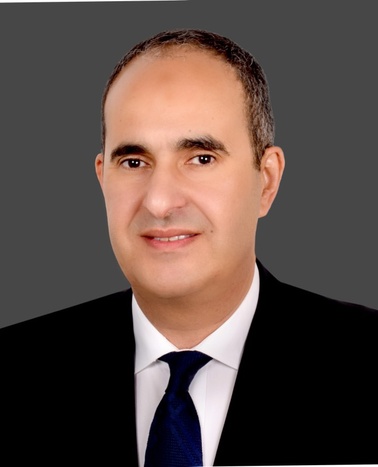
Haytham ElBendary
Haytham ElBendary, IE University marketing professor, has extensive experience in his field, where he has held managerial positions for more than 25 years in corporations like the Coca-Cola Bottling Company, Kraft Foods International and PepsiCo bottlers.
As an accomplished, self-directed sales and marketing executive, Haytham has an uninterrupted record of success in leading organizational sales and marketing, as well as transformation strategy, brand and channel development, distributor management, export markets and high-performance team management on an international scale. He crafted the transformation and go-to-market (GTM) strategy for multiple distributors in GCC and African markets to focus on channel growth drivers.
Haytham is a results-oriented and dynamic communicator recognized for focusing on the core strategic pillars for the business: market share, volume, revenue and sustainable net profit.

I loved the idea of having a lot of hands-on projects. So, the learning experience was not just the theoretical background but also allowed me to apply my learning to projects and collaborate with people from across the world.
What were your reasons for choosing to study the IE Brown Executive MBA?
Selecting a business school for an executive MBA is not an easy feat. In fact, I spent more than six months evaluating business schools across Europe and the US, assessing the pros and cons before I made my decision to pursue the IE Brown Executive MBA. The main reasons I chose the IE Brown Executive MBA are that I was impressed with the partner schools' rankings and reputation, the rich curriculum and the expert faculty members. Furthermore, the program schedule is very convenient for executives.
Could you describe your IE Brown Executive MBA experience in one word?
Rewarding. The experience was eye-opening in business and in life. The IE Brown Executive MBA changed my perspective on leadership and sharpened my skills not only in business but also in my personal life, helping me become a true leader.
How do you feel the IE Brown Executive MBA has changed your life, both professionally and personally?
Through its rich curriculum in a large variety of areas including business, the arts, sustainability, humanity, political economy, culture, entrepreneurial management and ethnographic research, I have learned to lead confidently and how to assess things from all aspects of the organization. This newfound knowledge gave me confidence in both my personal and professional life. I’ve been able to reach new heights in my career—I was promoted faster as my performance improved—and my organization skills are reflected as I am able to spend more time with my kids.
What advice would you give to professionals who are about to begin the IE Brown Executive MBA?
Work hard to achieve your objectives, ask questions, organize your schedule to make room for studying and your family, and enjoy your time on both campuses. The connections with peers and faculty are equally important—build your network with your cohort and spend more time together during the face-to-face time in Madrid, Providence and other locations.
Can you tell us about your work as an alumni ambassador for the IE Brown Executive MBA?
I attended several conferences as a speaker with both IE Business School and Brown University School of Professional Studies with the new cohort for the IE Brown Executive MBA. I explained the benefits of the program and also tried to help new students by describing my experiences both on and off campus. Furthermore, I am also a mentor in the Nelson Center for Entrepreneurship B-Lab where I support master’s students in their entrepreneurial master’s projects via assessment of their business strategy.
You’ve had extensive experience in both studying and teaching at IE Business School. How has your experience as a student impacted your approach to teaching?
Being an IE Brown Executive MBA student helped me feel confident when I began to teach the same material I previously learned. This also brings me very close to the students because I understood their challenges with the assignments, as well as the general workload. My students appreciated this and it also helped me deliver the objective of the courses faster and in an easier way.
Two of the marketing campaigns you created during your career have broken Guinness World Records; could you tell us more about these?
Success always comes from the determination to achieve a challenging goal. It is a result of setting the right goal, implementing the right strategy and utilizing solid execution. This comes from incredible teamwork—all my team members have the same set of priorities and goals and we work on the same path.
During my work with Pepsi Bottler, the idea of breaking the Guinness World Record in two different marketing campaigns came as a symbol of a team who can break records and push each other to work harder towards a greater goal.
The first broken record was achieved by my team, Pepsi bottler SIPCO, based in Jeddah, Saudi Arabia in 2013 for the largest aluminum can sculpture. Our can sculpture was made up of 66,400 cans, breaking the previous record set by the Aluminum Association (US) at the Brown County Fairgrounds in Green Bay, Wisconsin with a chain measuring 5.37 miles using 66,343 drink cans.
The second broken record was also achieved by my team in Pepsi bottler SIPCO, based in Jeddah in 2015. We created the largest football mosaic, made with 5,800 footballs.
You’ve had an impressive career both in industry and academia, and you’re currently completing your DBA at IE Business School. How do you balance the competing demands of work, teaching and study?
The key success factor to balancing life as a professor, student, executive and father is to set your priorities straight, organize your time and allocate enough time for each goal during the week. Another way to achieve this is to love what you are doing. I love my job, teaching class, DBA research and my family. All this leads me to work hard toward achieving my goal and organizing my time between assignments.
What important lessons have you learned throughout your career that you’d like to share with others?
I’ve learned three main lessons along the way. The first is that you will face many challenges in life, but nothing is impossible if you have the determination to achieve your goal. It’s imperative to love what you are doing in order to have the energy to face the challenges and overcome them.
The second lesson is that failing to plan is planning to fail. Set your goals clearly and draw the steps behind each goal, take solid steps toward your objective and organize your time accordingly.
The final lesson is to adapt to the environment and reset your goal accordingly. Many people will fail to achieve their goals due to their surroundings. In order to move from good to great, you must face the facts and assess your performance according to the variables around you.